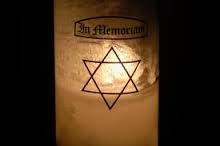
It is never easy to lose a loved one.
Below are resources that can help your family learn more about Jewish funeral and mourning traditions as well as support for children who are experiencing loss.
What Happens At A Jewish Funeral:

At a Jewish funeral, friends and family gather to remember the person who has died. You may notice that immediate family members (spouse, children, parents and/or siblings) of the person who has died are wearing a torn ribbon pinned to their clothes—this ritual comes from Biblical time when mourners ripped their clothes when they learned of a loved one’s death. The funeral may be lead by a rabbi, cantor or other Jewish leader. Usually psalms are read, the Hebrew prayer for the dead, El Malei Rachamim, is recited and a loved one shares a eulogy about the person who has died. The Mourners Kaddish, a prayer that affirms life and God’s greatness, is recited. The funeral may take place at a synagogue, funeral home or at the cemetery. The casket will be closed. When the casket is lowered into the ground, it is the tradition for those who are present to shovel dirt onto the casket. For the first year, the grave will not be marked with a stone. Families will gather a year after the funeral for an unveiling ceremony, in which the stone is laid.
It is certainly a personal decision about whether or not to bring your child to the funeral of a loved one. It is important if you choose to do so to talk about the funeral ahead of time. Many families will bring a babysitter along so that if the child feels like he/she would prefer to wait outside, parents can remain.
Every year, loved ones light a special memorial candle called a Yahrzeit candle on the anniversary of their loved one’s death. This rotual is something that you can include children in, explaining that the candle is a way of remembering your loved one’s spirit and bringing your special memories to mind.
What Happens at Shiva:
After the funeral, a meal of consolation is shared at the synagogue or at the mourner’s home. Before entering the home, a bowl of water will be offered to ritually wash one’s hands. Jewish tradition has rituals that people follow after the death of a loved one. The best known ritual is shiva, which means seven, and is a period of intense mourning lasting seven days. During that time, people in mourning open their homes for friends and family to come over, visit and remember their loved one who has died. People will often have a prayer service in the morning and evening during shiva. Some people do not sit shiva for a full 7-day period and choose 3 or 5 days instead.
If you are invited to a shiva, it is good to bring food. You will notice that mirrors are covered; this is because those in mourning are to focus inward and not be concerned about external appearances. At many houses of shiva, children will be present. It is important to explain that going to shiva is different from going to a party, even though children may see friends and family and eat food, similar to a party.

Everything you wanted to know about funerals and shiva.
- Consult this guide from PJ Library on how to talk to children about death.
- 18Doors offers tips on discussing Jewish perspectives on death with children.
- Unsure of whether to bring your child(ren) to a funeral or shiva? This guide might help.
- No matter what, it’s important to be open and direct about death and dying with children.

There’s nothing like a PJ Library book!
There are many children’s books about illness, aging, and loss. Check out lists of suggestions from PJ Library and Kveller.




